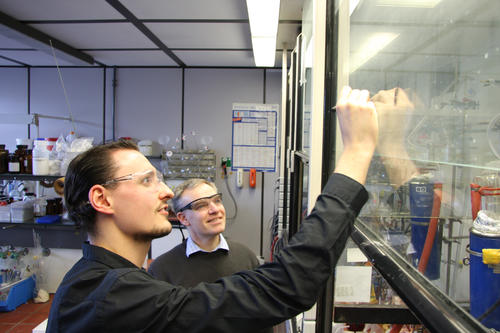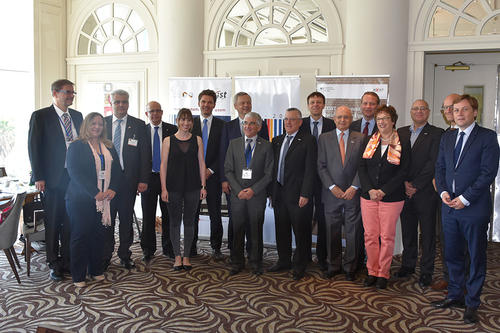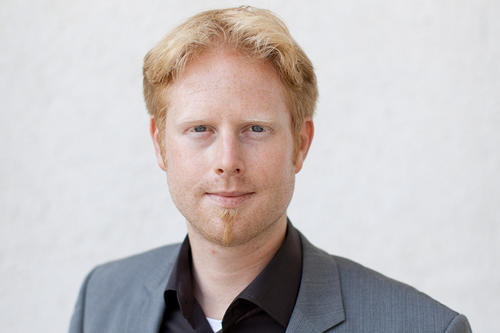On the Move in the “Startup Nation” of Israel
University spinoffs in Germany and Israel receive support from the German Federal Ministry for Economic Affairs and Energy – and Freie Universität is among those benefiting
Jul 23, 2015
Chemistry Professor Rainer Haag (in back) of Freie Universität, shown here with a graduate student in his lab, marketed an invention together with colleagues from Israel.
Image Credit: Annika Middeldorf
Participants at the kickoff event: Brigitte Zypries (fourth from right), Steffen Krach (sixth from left), and Professor Klaus Mühlhahn, the vice president of Freie Universität Berlin who is responsible for international matters (seventh from right)
Image Credit: Projektträger Jülich - Ralf Dolk
Steffen Terberl heads Profund Innovation, the service center for technology and knowledge transfer at Freie Universität Berlin.
Image Credit: Profund Innovation / Freie Universität
What Brigitte Zypries inaugurated on June 29 in Tel Aviv is a pilot project: In the presence of seven university presidents and vice presidents, including Professor Klaus Mühlhahn, the vice president of Freie Universität Berlin who is responsible for international matters, Zypries, a state secretary serving at the German economics ministry, and Berlin state secretary for science and research Steffen Krach launched “EXIST Startup Germany – Israel.” This makes Israel the first country to partner with the startup support organization, which has previously been aimed only at students, graduates, scientists, and researchers from Germany. Startup founders from Israel can now also apply to EXIST and be included in the EXIST networks in the Berlin/Potsdam area. Steffen Terberl, head of Profund Innovation, the service center for technology and knowledge transfer at Freie Universität Berlin, explains why Israel is so interesting as a partner country.
Mr. Terberl, what can Freie Universität learn from Israeli higher education institutions?
Israel is a “startup nation”: The country’s culture of entrepreneurship is so highly developed that higher education institutions no longer need to raise awareness or do outreach for the idea of starting a business at all. Many students want to become entrepreneurs and work independently on their own initiative. Higher education institutions in Israel also see themselves very much as being in service to society. They get involved in social projects, but they also work with great drive to translate research results into applications. This makes them key institutions in a country that lives on science, academia, and research. Higher education institutions and startups there are much more international in their thinking and planning. That’s because the domestic market is so small that they have to look to the United States and Europe right from the start. The end result is that this makes them grow faster. On top of that, the universities are very strong in terms of research expertise, and there is a relatively large number of investors who provide capital to startups. This combination gives rise to extremely competitive technology startups.
How does Freie Universität work together with Israeli universities in the area of knowledge and technology transfer?
There are various cooperative initiatives in place. An invention made jointly by Rainer Haag, a chemistry professor at Freie Universität, and Israeli colleagues is being marketed by RAMOT, the technology transfer company of Tel Aviv University. We are also in contact with StarTAU, the startup support organization of Tel Aviv University. On this trip, I am also making my second visit, together with my colleague Claudia Keil-Dieckmann, the officer responsible for patent and licensing matters at Freie Universität, to our colleagues at Yissum, an intellectual property commercialization agency that is responsible for technology transfers at the Hebrew University of Jerusalem. Yissum has existed since 1964; it is among the most experienced and successful companies of its kind in the world, and has already successfully marketed licenses for 800 technologies. The Center for International Cooperation at Freie Universität helped us build these ties.
What opportunities are offered by the new program “EXIST Startup Germany – Israel” that has been launched by the German Federal Ministry for Economic Affairs and Energy?
The program will help to institutionalize dialogue between Israeli and German higher education institutions and startup founders. Entrepreneurs from Israel can tap into the European market more easily and faster from Berlin. Israeli higher education institutions benefit when they license patents to startups and these companies, equipped with startup funding, can then operate throughout Europe right away from Berlin and generate sales accordingly. In turn, we in Berlin and Brandenburg can learn from the Israelis’ extraordinary startup spirit and create jobs together with them.
The interview was conducted by Marion Kuka.
This text was originally published in German in campus.leben on June 29, 2015.



